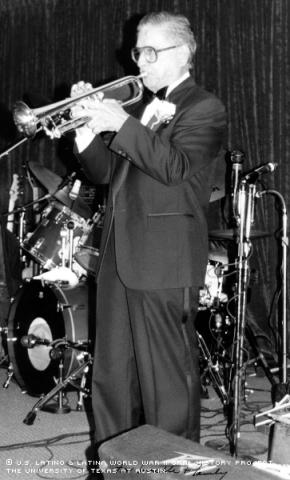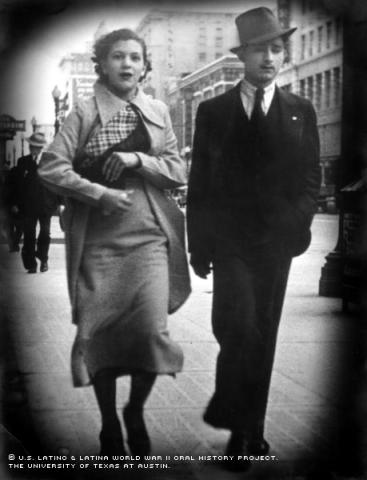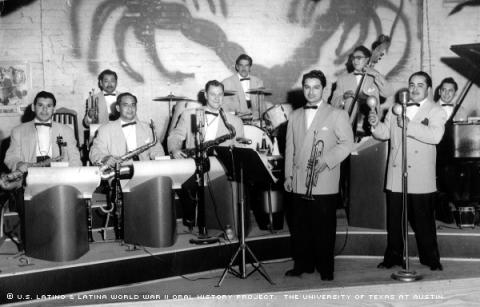



By Christopher Trout
At home in Houston in the 1940s, Johnnie Martinez was a well-known entertainer. He eventually would own a nightclub, lead his own big band, the Johnnie Martinez Band, and even own his own record label, Alameda.
But during World War II, circumstances were different.
In the Army, Martinez was somewhat of an unknown. He delivered medical supplies and messages in a standard-issue jeep across the front lines from Luxemburg to Belgium for the Headquarters Company, 765th Shop Battalion, which was a quartermaster unit of the Army made up of technicians who included electricians and carpenters. He, however, had no specialty.
"They never did know who I was or what I do," said Martinez of the other soldiers. "They would just send me from one place to another."
Before he volunteered for service in the Army, Martinez made his living as a musician and supported his wife, Gloria Sepolio Martinez, and two daughters, Alice and Irene. As a band leader and trumpet player, he toured the United States, playing swing in large orchestras with some of the best-known players of the time.
While his life may have resembled that of a celebrity, he came from more humble beginnings. For the first eight years of his life, Martinez lived in Rosebud, Texas, with his parents, Anastacio Martinez and Teresa Jaime Martinez, as well as his five siblings. His father had learned music in Mexico and could play several instruments. Anastacio came to the U.S. to pursue his own music career, turning to field labor when he realized it was impossible to support a family from the occasional job at a baptism or wedding. Teresa stayed at home taking care of the children.
"I lived my young life through a Depression," Martinez said. "My father had a hard, hard time. But, we survived. It was something we fought to get out of. Now that I look back on it, I'm proud that I was there."
In 1926 the Martinez family left for Waco, where young Martinez continued his education until the eighth grade. (He later would attend the Southern College of Fine Arts for three years.)
By that time, his father had taught him how to play the trumpet and was in the habit of taking him along on gigs. However, father and son never performed together on stage.
"I never did get to play with my dad because by the time I started playing professional music, my father was already up in age and didn't play anymore," Martinez said.
While in Waco, Martinez met and married Gloria Sepolio. They eventually moved to Houston, where Martinez's career and role as a family man blossomed. He began playing gigs in nightclubs all over town and lent his talent to many area dances.
Martinez says he became very popular. On one occasion, he and Gloria went out to see jazz great Tommy Dorsey play at the Tidelands and by the end of the night, were sipping drinks with Dorsey and surrounded by fans asking both Dorsey and him for autographs.
While in Houston, Gloria gave birth to the first two of six daughters the couple would eventually have. Unfortunately, there was also tragedy: Both Alice, 2, and Irene, 4 months, died.
"In two days we lost both of them," Martinez said. "We lost the first one [Irene] on a Tuesday and buried her on a Wednesday. We came home and lost the other one that night.
“In those days there were a lot of children dying of some infection in their stomachs.”
After the Japanese attack on Pearl Harbor, Martinez answered the call to support the country while troops were away.
"During the war they wanted everybody to work to help the cause," he said. "Tony Martin [a famous vocalist who also appeared in films] was made chief expediter for the Navy, and he saw my name in the list of professional musicians and called me to be employed by the Navy at Brown Shipyard."
Martinez worked building submarine chasers with the other men at the shipyard. On occasion, he’d play with a band when a new ship was launched.
On April 10, 1944, he enlisted in the Army and was promptly sent to Kelly Field in San Antonio. He worked there as an interpreter for a couple of weeks; several of the inductees coming from South Texas were Mexican Americans who spoke no English. He was then sent to Ohio for basic training.
There, Martinez formed a band with a few other men and eventually made a formal request to be placed in a unit that had some other musicians in it. After two weeks of pushing his commander to transfer him, he was attached to the Headquarters Company and was soon traveling to France, via New Jersey and New York.
"We had to turn in at 10 that night," he said. "The next morning I felt the boat rocking and I went up to the main deck and there was no New York or nothing left."
Along with familiar shores, Martinez was leaving behind his family, his music and a whole way of life.
When his unit finally arrived in France, the commander called Martinez into his office and asked him what his trade was.
"I told him I was a musician," he said. "He said; 'A musician? What in the world am I going to do with you?'"
The Army gave him a jeep and made him a courier a couple of days later. From then until the end of the war, Martinez would spend his days running messages and supplies along the front lines.
At the time of his Nov. 3, 1945, discharge, he’d risen to the rank of Technician 5th Class, after 17 months in the Army. Among other honors, he earned the European, African and Middle Eastern Ribbon and the Good Conduct Medal.
Martinez returned to Houston with no more than a small wound on his forehead from jumping off his jeep. Shortly after returning, he began to look for work.
"I came back to Houston and there were no jobs available," he said. "So, I went back to the music business -- and that's what I did."
After his return, Martinez started his own band, the Johnnie Martinez Band, and became the owner and operator of the Palladium in downtown Houston, where he booked such musicians as Henry James and Elvis Presley. Unfortunately, despite his popularity, he says the press often ignored him.
"I did open doors with my music, but it was sad," he said. "I played many occasions that were something big. A reporter would be there to report the event and he would pick one Anglo from the group and talk about how great he was, but he'd never mention my name. I was the leader. I was the conductor. I did a lot of things, but I never did get credit for them."
Eventually, Martinez says he got sick of only playing music and went out looking for a job again. This time he found one with a beer company. The position was only supposed to be part-time, but Martinez made a career of it and ended up working as a representative for beer companies for 30 years.
Martinez may not have received all the recognition he deserved in his musical career, and he may have gone through great hardships, but in the end, he did what he wanted.
"In my life, I finally came around and accomplished what I had in mind: to have something when I retire, because I knew the time was coming. I own six houses, and that's what I wanted for retirement. My children deserve the best that I can give them, and I've given them one house each," Martinez said. "That is what I wanted."
Mr. Martinez was interviewed in Houston, Texas, on March 19, 2003, by Ernest Eguia.

